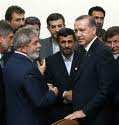
I’ve often wondered if the pace of modem life, the 24/7 new cycle, and the need for governments to respond in real-time to what is happening have had a negative impact on the conduct of diplomacy. Take, for example, the odd incident last week in which two American allies made great progress in a matter that the U.S. has defined as a major international concern. I’m referring to the agreement that Turkey and Brazil negotiated with Iran over the enrichment program. Within hours of the announcement of the agreement the U.S. circulated another draft resolution on sanctions to the UN Security Council and released a statement calling the agreement a ploy on Iran’s part to avoid further sanctions. It all amounted to what Reuters called a “deep rift” between the allies:
In signs of the deep rift between the United States and two influential nonpermanent members of the U.N. Security Council, Turkey and Brazil stepped up to defend their proposal as the right thing to do to reduce tensions over the Iranian nuclear impasse. “We know we did the right thing,” Brazilian Foreign Minister Celso Amorim told a news conference, flanked by Turkish Foreign Minister Ahmet Davutoglu. “We are seeking to follow a path of dialogue, a path of conversation and understanding, and that has produced results.” Brazilian President Luiz Inacio Lula da Silva and Turkish Prime Minister Recep Tayyip Erdogan traveled to Tehran earlier this month to broker the deal under which Iran agreed to send 1,200 kg of its low-enriched uranium abroad in exchange for specially processed fuel for its medical isotope reactor. Senior U.S. officials dismissed the fuel deal proposal, saying Turkey and Brazil appeared to have been hoodwinked by Tehran in its efforts to escape new U.N. sanctions.
In an earlier era, pre-cable news and the internet, perhaps the Brazilian and Turkish foreign ministers would have been invited to Washington for consultations over days and even weeks, and an effort would have been made to better coordinate diplomatic actions. Instead, we had multiple overlapping efforts and organizational timelines measured in hours that precluded thoughtful consultations. As it stands, our Secretary of State did plan a meeting with them this week, after the fact, which probably made for a rather awkward conversation.
Let’s accept as a given that Iran deployed a strategic gambit to divide the Security Council by negotiating an agreement that would be good enough to create the appearance of progress while preserving a stockpile of uranium for further enrichment. Let’s also agree to set aside for a moment the question of whether it was appropriate (or even shameful, as Thomas Friedman put it in his NYT op-ed) for our democratic allies to coddle democracy-crushing Iran. What should have been the proper U.S. response when our allies made a sincere effort to address a matter of great concern to us? The U.S. had a choice, for apparently a brief moment in time, to offer praise and encouragement to our allies or to dismiss out of hand the agreement that had been reached. Guess which option we chose? Like children taking a new bike for a spin around the block – without the training wheels – emerging powers Brazil and Turkey stepped up on the world stage and negotiated an agreement on a matter at the very top of the international agenda. They may have expected a parental slap on the back and a hearty “good job!” from the U.S., but sadly, like a neglectful parent, the U.S. seemed more annoyed than appreciative.
For those who believe that a managed transition to multipolarity is desirable, the U.S. missed an opportunity last week and showed once again that our diplomacy can be, well, a bit undiplomatic.
Image Credit: Jordan Times